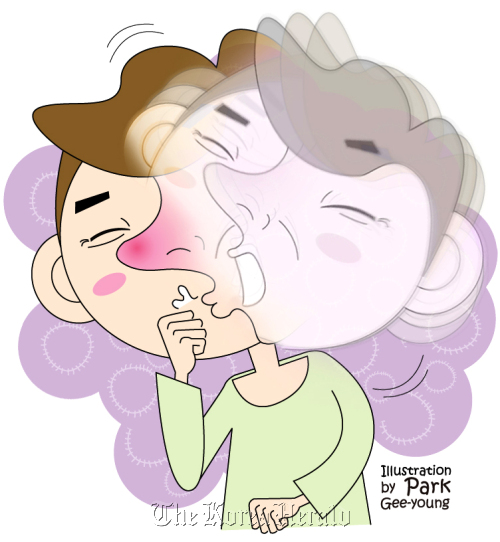A female patient visited the clinic after two months of persistent coughing. Initially she assumed that she had caught a common cold, but it was getting worse and made her lose bladder control now and again. She became worried that she might have lung cancer and decided to consult a doctor.
Coughing is a common symptom of most respiratory disorders and is a common reason for patients of all ages to consult their doctor. Chronic coughing has been estimated to affect up to 23 percent of nonsmoking adults in the United States, where it appears to be the fifth most common symptom seen in outpatient clinics.
Coughing is normally a physiological reflex to remove foreign elements such as environmental pollutants or endogenous elements such as excess mucus that may obstruct the throat. Physiological coughs usually disappear when the causal stimuli are removed. Many people accept coughing as one of the vagaries of living, while others consult a physician. In many cases, patients visit the doctor when they feel “something is wrong.”

A chronic cough is a cough persisting for more than eight weeks, a sub-acute cough is one lasting from three to eight weeks, and an acute cough lasts less than three weeks.
The most common cause of acute and sub-acute coughs is the common cold. Less common causes include pneumonia and acute bronchitis.
For chronic coughs, upper airway cough syndrome, asthma, and acid reflux are responsible for 90 percent of cases in non-smokers.
Upper airway cough syndrome, the most common cause of chronic coughs, is caused by irritation from secretion in the upper airway due to rhinitis or sinusitis. Typical symptoms are frequent nasal discharge, the sensation of liquid dripping into the back of the throat or frequent throat clearing. But it can happen with coughing as the only symptom. The symptom usually improves within two to three weeks with antihistamines and decongestants, with or without intranasal corticosteroid or intranasal antihistamine. Sometimes, a sinus x-ray and antibiotics are required for sinusitis.
The second common cause of chronic coughing is asthma. It commonly comes with wheezing and shortness of breath, but coughing could again be the only symptom. Asthma patients tend to have family history of allergy or asthma and worsening symptoms after exposure to cold, dust, or certain fumes. It can be diagnosed by careful history-taking and an adequate provocation test, called a bronchial provocation challenge test. Asthma is confirmed as the cause if the patient shows improvement with appropriate asthma treatment.
The next cause is acid reflux, which comes with heartburn or a sour taste but can also come with coughing. Acidity in lower esophagus can be checked by Ph monitoring, to diagnose or monitor improvement.
Drugs can also cause chronic coughs. Eliminating an anti-hypertensive medicine called ACE inhibitor ― which is used for blood pressure control, heart failure or kidney disease ― may resolve coughing.
In smokers, evaluation of bronchiectasis and chronic bronchitis is needed and pulmonary tuberculosis is not an uncommon cause if you live in a high tuberculosis prevalence area like Korea.
Lung cancer, the most feared disease, causes less than two percent of chronic coughs, but a chest radiograph is recommended for coughs persisting for more than eight weeks.
Persistent vigorous coughing may cause complications like headaches, insomnia, dizziness, tiredness, and urinary incontinence. Cough-induced rib fracture is another painful and potentially serious complication. Women with decreased bone density are at high risk of suffering a cough-induced rib fracture but it can also occur in patients with normal bone density.
Fortunately, with proper tests and treatment, most chronic coughs can get better.
In the aforementioned patient’s case, she was diagnosed with asthma after provocation and sputum tests, and stopped coughing within one week of treatment.
If you have a persistent cough, don’t hesitate to see a doctor. You could be free from both the nagging cough and your worries with simple medicine.
By Choi Dong-chull MD., PhD.
Coughing is a common symptom of most respiratory disorders and is a common reason for patients of all ages to consult their doctor. Chronic coughing has been estimated to affect up to 23 percent of nonsmoking adults in the United States, where it appears to be the fifth most common symptom seen in outpatient clinics.
Coughing is normally a physiological reflex to remove foreign elements such as environmental pollutants or endogenous elements such as excess mucus that may obstruct the throat. Physiological coughs usually disappear when the causal stimuli are removed. Many people accept coughing as one of the vagaries of living, while others consult a physician. In many cases, patients visit the doctor when they feel “something is wrong.”

A chronic cough is a cough persisting for more than eight weeks, a sub-acute cough is one lasting from three to eight weeks, and an acute cough lasts less than three weeks.
The most common cause of acute and sub-acute coughs is the common cold. Less common causes include pneumonia and acute bronchitis.
For chronic coughs, upper airway cough syndrome, asthma, and acid reflux are responsible for 90 percent of cases in non-smokers.
Upper airway cough syndrome, the most common cause of chronic coughs, is caused by irritation from secretion in the upper airway due to rhinitis or sinusitis. Typical symptoms are frequent nasal discharge, the sensation of liquid dripping into the back of the throat or frequent throat clearing. But it can happen with coughing as the only symptom. The symptom usually improves within two to three weeks with antihistamines and decongestants, with or without intranasal corticosteroid or intranasal antihistamine. Sometimes, a sinus x-ray and antibiotics are required for sinusitis.
The second common cause of chronic coughing is asthma. It commonly comes with wheezing and shortness of breath, but coughing could again be the only symptom. Asthma patients tend to have family history of allergy or asthma and worsening symptoms after exposure to cold, dust, or certain fumes. It can be diagnosed by careful history-taking and an adequate provocation test, called a bronchial provocation challenge test. Asthma is confirmed as the cause if the patient shows improvement with appropriate asthma treatment.
The next cause is acid reflux, which comes with heartburn or a sour taste but can also come with coughing. Acidity in lower esophagus can be checked by Ph monitoring, to diagnose or monitor improvement.
Drugs can also cause chronic coughs. Eliminating an anti-hypertensive medicine called ACE inhibitor ― which is used for blood pressure control, heart failure or kidney disease ― may resolve coughing.
In smokers, evaluation of bronchiectasis and chronic bronchitis is needed and pulmonary tuberculosis is not an uncommon cause if you live in a high tuberculosis prevalence area like Korea.
Lung cancer, the most feared disease, causes less than two percent of chronic coughs, but a chest radiograph is recommended for coughs persisting for more than eight weeks.
Persistent vigorous coughing may cause complications like headaches, insomnia, dizziness, tiredness, and urinary incontinence. Cough-induced rib fracture is another painful and potentially serious complication. Women with decreased bone density are at high risk of suffering a cough-induced rib fracture but it can also occur in patients with normal bone density.
Fortunately, with proper tests and treatment, most chronic coughs can get better.
In the aforementioned patient’s case, she was diagnosed with asthma after provocation and sputum tests, and stopped coughing within one week of treatment.
If you have a persistent cough, don’t hesitate to see a doctor. You could be free from both the nagging cough and your worries with simple medicine.
By Choi Dong-chull MD., PhD.

The author is a doctor at the Department of Allergy of the Samsung Medical Center. ― Ed.








![[Kim Seong-kon] Democracy and the future of South Korea](http://res.heraldm.com/phpwas/restmb_idxmake.php?idx=644&simg=/content/image/2024/04/16/20240416050802_0.jpg&u=)







![[KH Explains] Hyundai's full hybrid edge to pay off amid slow transition to pure EVs](http://res.heraldm.com/phpwas/restmb_idxmake.php?idx=652&simg=/content/image/2024/04/18/20240418050645_0.jpg&u=20240418181020)

![[Today’s K-pop] Zico drops snippet of collaboration with Jennie](http://res.heraldm.com/phpwas/restmb_idxmake.php?idx=642&simg=/content/image/2024/04/18/20240418050702_0.jpg&u=)